Heckling, laughter and tears - performing in care homes has its challenges but care home entertainers wouldn’t have it any other way
carehome.co.uk’s launched its talent competition, Care Home Idol, earlier this year, shining a spotlight on professional care home entertainers whose task it is to entertain and amuse care home residents.
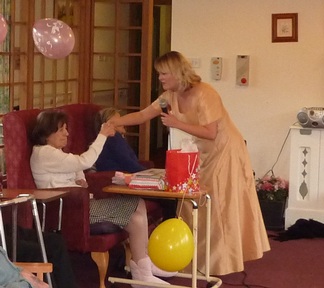 Many care home managers and owners organise regular weekly or even daily entertainment in their care homes. The benefits to residents seem to be inestimable. However, for a professional entertainer, performing in care homes can be challenging.
Many care home managers and owners organise regular weekly or even daily entertainment in their care homes. The benefits to residents seem to be inestimable. However, for a professional entertainer, performing in care homes can be challenging.
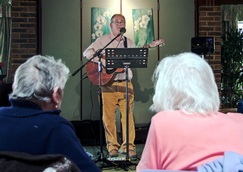 Residents with conditions such as dementia can often shout out during performances, heckling therefore is a regular occurrence for many care home entertainers, Carole Laine from the entertainment company says: “It is inevitable that sometimes you will get heckled. Some service users cannot control their actions and it becomes like a Tourette’s twitch.”
Residents with conditions such as dementia can often shout out during performances, heckling therefore is a regular occurrence for many care home entertainers, Carole Laine from the entertainment company says: “It is inevitable that sometimes you will get heckled. Some service users cannot control their actions and it becomes like a Tourette’s twitch.”
Heckling can be off-putting for entertainers and even confidence crushing. Aimi Percival a performer based in the Hertfordshire area ( ), recollects: “The most memorable heckle was at a show with my performer Laura… As I came out in a red Santa dress to sing Santa Baby a lady called out ‘I can’t take much more of this!’ – not a quote I used as an advert on my website! I get used to being sworn at and being told to go away. This is easy to deal with when you look at it this way; not everyone likes the theatre/entertainment and you are going into their space, their living room, to them it is home, and they shouldn’t have to listen to you if they don’t want to. Although this is a job I am always respectful of this.”
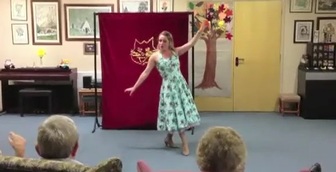 Ms Laine similarly has found her own way of dealing with heckling, she says: “Sometimes it is a subconscious call for attention and I have found if you make an effort to come closer and try to involve them gently then sometimes they calm down and enter your own world instead of pushing you away.”
Ms Laine similarly has found her own way of dealing with heckling, she says: “Sometimes it is a subconscious call for attention and I have found if you make an effort to come closer and try to involve them gently then sometimes they calm down and enter your own world instead of pushing you away.”
Sometimes a song choice in particular can spark a heckle; Andy Martin a performer who regularly sings not only his own songs, but also covers in care homes experienced a remarkable heckle whilst performing classic songs from WWII; “I had just finished singing a medley of war time songs – ‘Kiss me goodnight Sergeant Major’ etc and a lady shouted ‘Can’t you play something more modern – the war’s over you know.”
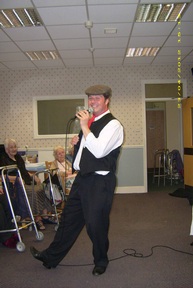 Mr Martin whose company is entitled continues: “I realised that actually she had a point. If you are say, 80 your heydays would have been in the 50’s and not in the 40’s. I subsequently started playing a lot more from that era but still play the war songs at the right time of year.”
Mr Martin whose company is entitled continues: “I realised that actually she had a point. If you are say, 80 your heydays would have been in the 50’s and not in the 40’s. I subsequently started playing a lot more from that era but still play the war songs at the right time of year.”
Ms Laine says: “I have found that there are increasing numbers of younger residents in the care homes, sheltered housing and day centres. Some of them were not even born when WWII happened so it is not always appropriate to keep bashing out Vera Lynn, etc… There is much enjoyment to be had in more modern music… I have also found that if they are listening to a quality singer, singing a quality song then they will enjoy almost anything you perform. It’s more about keeping things visual and entertaining.”
Ms Percival’s entry on Care Home Idol reflected this era shift with the title of her video; ‘1950s sing along’ she said: “Although I have a ‘sentimental journey and a ‘war time’ show I personally find that this can be overdone.”
She also warns against the dangers of inciting too much nostalgia with song choice, nostalgia often being the thinking behind a WWII tune; “Some people do not want to be reminded of the past or specific moments and I generally think upbeat and fun is a good route to go down with song choice.”
who began her singing career in the 1980s has found that nostalgic songs can create an emotional atmosphere in a care home: “I have found ‘We’ll Meet Again’ provokes tears so quickly move onto happier tunes.”
However who performs his own variety act asserts that “Nostalgia is definitely the best way to go.”
“The dictionary defines it as ‘a sentimental or wistful yearning for the happiness felt in a former place, time or situation.’ I try to recreate that happiness and that is why we all get good feelings when we feel nostalgic… Residents always thank me for bringing back such memories.” 
Entertainers can often struggle with the heightened emotional atmosphere that exists in care homes. Many residents struggle to control their emotions which can in turn affect a performer emotionally; some like Ms Percival take steps to keep things light. She says: “I often get a few tears from songs and in all honesty this is why I make my sets more upbeat than slow. A lot of the time it is the male residents, which in some ways it is harder to experience, but I find a little talk afterwards about their memories or even just an acknowledgement often helps.”
Many entertainers embrace this as part of life for an older person. Ms Pelling said: “On some occasions I will ask if they would like me to skip to another song and they always say no, they are just moved by the song.”
There is no doubt that entertainers have to work hard to keep an older audience enthralled, Ms Laine says: “Attention spans can be very much like a child so costume changes regularly will re-stimulate, choreography to give them something to watch, singing parts of a song that they will recognise and not singing a lengthy introduction no one remembers and filling silences with chat or movement (I hate silence).
“Also getting up close and touching shoulders, holding hands or encouraging the audience to get up and dance with you if they are able (or even taking the hand of someone in a wheelchair and dancing with them). And most importantly –looking everyone in the eye!”
Keeping the room’s interest can be even harder if you are not a singer and therefore unable to act on nostalgia or the memory of music. Owen Reid performs a ventriloquist act in care homes called . He says: “Overall the residents reaction to my act is surprising; my Puppet has many admirers as he flirts with the women. The residents’ behaviour can be different dependent on health and mind, the majority smile, laugh and applaud but always wanting more… I think it is very important for the residents to have entertainment as I’m sure they would go stir crazy, my act also appeals to the residents as they would not normally get to see a ventriloquist act. One lady resident told me it was the first time in years she laughed after losing her husband so entertainment does make a difference.” 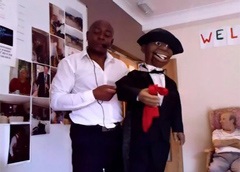
It is the miracles and the surprises which keeps these particular performers on the care home circuit. Ms Laine said: “The very best surprise… Is when you get told that a particular resident hasn’t shown any reaction to anything in days, weeks, months and when you are performing they suddenly join in with you. Nothing can match the joy that brings; to you as a performer, to know you’ve touched them, to the carers; who see something magical and to the resident themselves; who have just found some wonderful memory that they thought they had lost forever.”
Care home entertainers’ anecdotes can be heartening and even amusing, Mr Shaw recalls an amusing incident: “A lady called me over and said ‘can I just tell you, you’ve got a great voice, in fact I would say you are better than Frank Sinatra’ I said: ‘Well I’m very flattered and that’s a great compliment but I don’t think so, he is a legend.’ ‘Oh no’ she said, ‘we had him here last week and he was rubbish!’ Talk about bringing you down to earth with a bump!”
To see all the entries for Care Home Idol and vote for your favourite click here www.carehome.co.uk/idol/
Latest Features News
 25-Nov-19
2019 Election: Boris Johnson leaves social care in 'too difficult box' but Labour vows to end 'crisis'
25-Nov-19
2019 Election: Boris Johnson leaves social care in 'too difficult box' but Labour vows to end 'crisis'
 18-Oct-19
Podcast: Wendy Mitchell and dementia: 'My biggest fear is not knowing who my daughters are'
18-Oct-19
Podcast: Wendy Mitchell and dementia: 'My biggest fear is not knowing who my daughters are'
 27-Sep-19
Exclusive: Care minister backs care workers' call for time off to grieve and attend funerals
27-Sep-19
Exclusive: Care minister backs care workers' call for time off to grieve and attend funerals
 19-Sep-19
Podcast: Gyles Brandreth says poetry helps ward off dementia
19-Sep-19
Podcast: Gyles Brandreth says poetry helps ward off dementia
 30-Aug-19
Edinburgh Fringe funnyman joins comics facing toughest audience at care home gig
30-Aug-19
Edinburgh Fringe funnyman joins comics facing toughest audience at care home gig